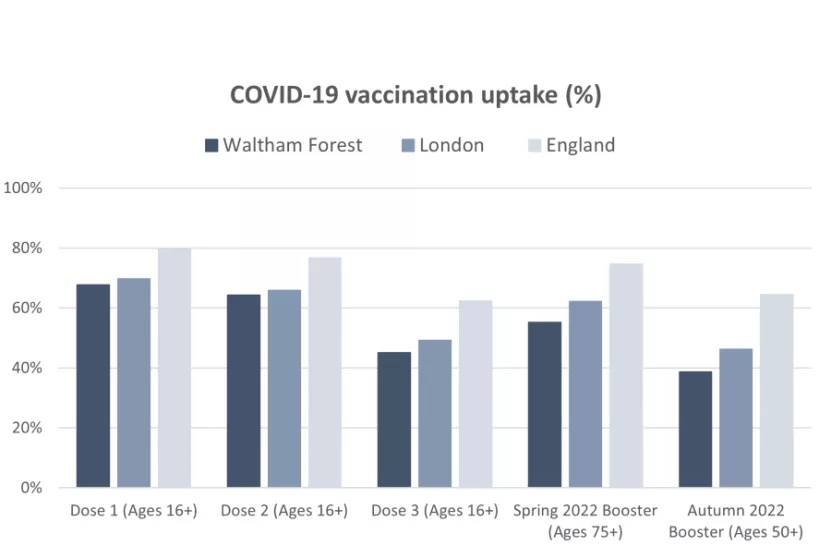Last updated: 15 August 2023
Next review: 20 June 2024
This content is part of the Waltham Forest JSNA. To see other JSNA content, visit the JSNA landing page
COVID-19, a disease caused by novel coronavirus SARS-CoV-2 was declared a global health emergency for over three years from January 2020 to May 2023. COVID-19 has killed nearly seven million people worldwide and remains a serious health concern, especially to people who are at higher risk of severe COVID-19 and other respiratory infections such as older people; those who are pregnant; unvaccinated; with weakened immune systems; and people with certain long-term conditions.
There is also growing evidence to suggest that individuals who have suffered from both mild or severe COVID-19 can experience prolonged symptoms or develop long-term effects, often described as ‘long COVID’. An estimated 1.9 million people in the UK (2.9% of the population) were experiencing self-reported long COVID (symptoms lasting for more than four weeks after COVID-19 infection) as of 5 March 2023 [1].
COVID-19 vaccines have been shown to reduce the risk of infection, severe illness, hospitalisation, and death. At least two doses of vaccine are recommended to protect against symptomatic disease, hospitalisation, and death, however the waning effect of the vaccine over time has necessitated the introduction of booster programmes for optimal protection [2]. Everyone aged 16 and over were offered a booster dose (third dose) once they had received their first two doses. The subsequent seasonal booster doses (also called spring and autumn boosters) have been offered to people at higher risk from severe COVID-19 to further boost protection against serious illness and hospitalisation.
By April 2023, around two thirds of Waltham Forest residents aged 16 and over (68%) have had at least one dose of COVID-19 vaccine. This is slightly lower than the London average (70%) and below the England average (80%).
Just under half (45%) of people aged 16 and over in Waltham Forest have had three doses of COVID-19 vaccine as of May 2023 compared to 49% across London and 62% across England as a whole.

Source: UK Health Security Agency using data from National Immunisation Management Service. [https://coronavirus.data.gov.uk/]. Date accessed: 10 May 2023
Both national and local data show significant gaps in COVID-19 vaccination uptake by ethnicity and deprivation. The ethnic groups with the lowest proportion of eligible people continuing to a fourth vaccination are Pakistani, Bangladeshi, and Black African, whereas White British ethnic group has the highest uptake among eligible adults; the Pakistani and Black African groups also had the lowest uptake of the third vaccination. People vaccinated with three doses and eligible for the booster doses, who are living in the most deprived areas, were least likely to continue to a fourth vaccination, with vaccination rates increasing as deprivation reduces [3]. Locally, the uptake follows broadly similar pattern.
References:
[1] Office for National Statistics. Prevalence of ongoing symptoms following coronavirus (COVID-19) infection in the UK: 30 March 2023. Date accessed: 11 May 2023
[2] UK Health Security Agency (2022). COVID-19: epidemiology, virology, and clinical features. Date accessed: 10 May 2023.
[3] Office for National Statistics (2023). Coronavirus and vaccination rates in adults by socio-demographic characteristic and occupation, England: December 2020 to March 2023. Date accessed: 11 May 2023